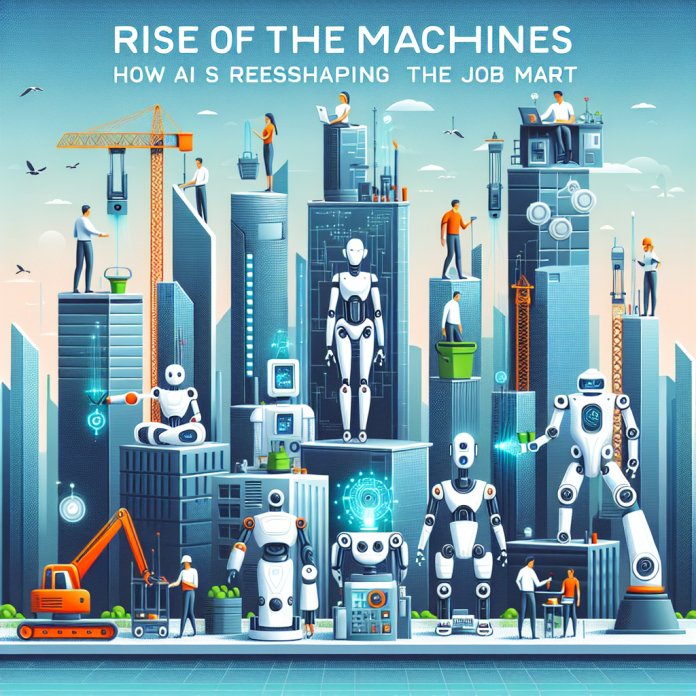The Impact of AI on Job Markets: Navigating the Future of Work
As we hurtle into the digital age, the rise of artificial intelligence (AI) has sparked unprecedented changes in the job market. From autonomous vehicles to automated customer service agents, AI technology is revolutionizing industries across the board. But with these advancements come concerns about job displacement and the future of work as we know it.
In this article, we will delve into the ways in which AI is reshaping job markets, explore the challenges and opportunities it presents, and discuss how individuals and organizations can adapt to this rapidly evolving landscape.
## The Rise of Automation##
One of the most significant impacts of AI on job markets is the rise of automation. Tasks that were once performed by human workers are now being taken over by machines equipped with AI technology. From manufacturing and logistics to healthcare and finance, automation is streamlining processes, increasing efficiency, and reducing costs for businesses.
For example, in the manufacturing sector, robots are being used to assemble products faster and more accurately than human workers. Companies like Tesla and Amazon have implemented robotic systems in their warehouses to handle tasks such as picking and packing orders, leading to significant gains in productivity.
While automation has its benefits, it also poses challenges for workers who may find their jobs at risk of being replaced by machines. According to a study by the McKinsey Global Institute, up to 800 million jobs worldwide could be automated by 2030, leading to significant disruptions in the labor market.
## The Gig Economy##
Another trend driven by AI is the rise of the gig economy. Platforms like Uber, Airbnb, and TaskRabbit have transformed the way people work, allowing individuals to take on freelance gigs and earn income on their own terms. These platforms use AI algorithms to match supply and demand, connecting customers with service providers in real-time.
While the gig economy offers flexibility and independence for workers, it also raises concerns about job security and benefits. Gig workers typically do not receive benefits such as health insurance or paid leave, and may face instability in their income due to the unpredictable nature of gig work.
## Upskilling and Reskilling##
As AI technology continues to advance, the need for upskilling and reskilling becomes increasingly important for workers to stay relevant in the job market. With automation replacing routine tasks, there is a growing demand for workers with skills in areas such as data science, artificial intelligence, and cybersecurity.
Companies are investing in training programs to upskill their employees and prepare them for the jobs of the future. For example, Amazon launched a program called Amazon Technical Academy to train non-technical employees in software development, providing them with skills to transition into higher-paying technical roles within the company.
Individuals also have a role to play in upskilling themselves and adapting to the changing job market. Online platforms like Coursera, Udemy, and LinkedIn Learning offer a wide range of courses in emerging technologies and soft skills, enabling individuals to acquire new skills and stay competitive in their careers.
## Ethical Considerations##
In the age of AI, ethical considerations around job displacement and data privacy are becoming increasingly important. As machines become more sophisticated and capable of performing complex tasks, there is a growing debate about the ethical implications of AI technology.
For example, the use of AI in hiring and recruitment processes has raised concerns about bias and discrimination. AI algorithms may inadvertently perpetuate existing biases in hiring decisions, leading to disparities in opportunities for underrepresented groups.
Similarly, the collection and use of personal data by AI systems raise concerns about privacy and security. Companies must be transparent about how they collect and use data, and ensure that individuals’ rights are protected in the age of AI.
## Navigating the Future of Work##
In the face of these challenges, individuals and organizations must adapt to the changing landscape of work brought about by AI technology. Here are some strategies for navigating the future of work:
1. **Lifelong Learning:** Embrace lifelong learning to stay competitive in the job market. Invest in acquiring new skills and knowledge that will be in demand in the future.
2. **Adaptability:** Be open to change and willing to adapt to new technologies and ways of working. Develop a growth mindset that enables you to thrive in a rapidly evolving environment.
3. **Collaboration:** Seek opportunities to collaborate with machines and AI systems rather than seeing them as a threat. Embrace the potential of AI to augment your capabilities and enhance your productivity.
4. **Ethical Leadership:** Advocate for ethical practices in the use of AI technology. Ensure that AI systems are designed and deployed in a way that upholds principles of fairness, transparency, and accountability.
As we navigate the future of work in the age of AI, it is essential to approach these changes with a sense of curiosity, adaptability, and ethical responsibility. By embracing the opportunities that AI technology presents and addressing the challenges it poses, we can create a future of work that is inclusive, sustainable, and human-centered.

